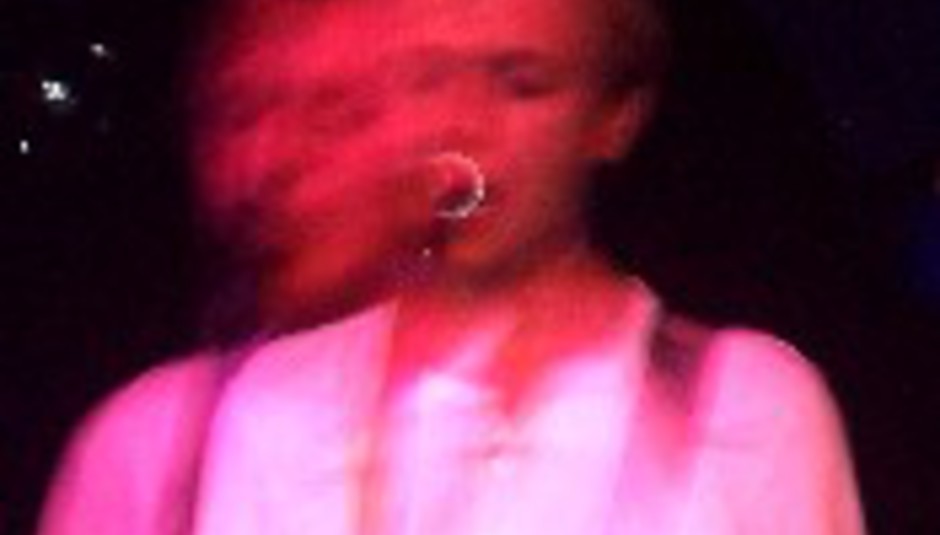But then, after numerous record company wrangles delaying the release of their second album ‘I To Sky’ and the likes of The Strokes and The Libertines being embraced like the little lost children of Benetton, JJ72 suddenly found themselves out of earshot and out of fashion.
Having lost original bass player Hillary Woods in 2003, founder members Mark Greaney and Fergal Matthews recruited Canadian bassist Sarah Fox (formerly of The Fangs) and set about writing songs for a third album. Since then, it has all been rather quiet but now they’re back, with a new single ‘Coming Home’ and their most extensive UK tour in three years.
“It feels great to be back!” exclaims an exuberant Fergal Matthews. “It’s just like starting from scratch all over again, rehearsing new versions of older songs. Now Sarah’s in the band we feel we can expand on those songs and ideas much further than we could previously.”
The dynamics of the music industry have changed dramatically since the band started out, not to mention the way “independent” guitar music is being marketed at the moment. How do JJ72 see this affecting their comeback?

“We didn’t know what to expect,” says Mark Greaney, seeming more relaxed and talkative than in the early days, when the band’s offstage demeanour reflected the pensive nature of their songs. “Everything we’re doing seems quite novel. In fact, at times, I don’t think we really know what we’re doing ourselves! Now Sarah is in the band it feels like our passion for doing this has been re-invigorated. We are to all intents and purposes a new band, and I honestly don’t think we’d still be doing it now if we had the same line-up as before.”
Which brings me onto the then-sudden departure of former indie pin-up bassist Hillary Woods. At the time, because the band weren’t in the limelight, not a lot was made of her leaving JJ72, and Mark Greaney still doesn’t expand on anything more than “she had her reasons for leaving so, best of luck to her…” With hindsight though, do the band believe things would have turned out differently if the current line-up had been in place from the start?
“I don’t think it would have been any different from day one to be honest,” admits Fergal. “The way we were before was the way we wanted to be, and that changed, and through that change we’ve got to where we want to be now, and we are a lot happier but…”
“No regrets, not then or now,” adds Mark. “It just kind of evolved naturally really.”
In the past JJ72 were seen by some as Mark Greaney’s (aka ‘The Voice’) backing band. Does the addition of Sarah Fox mean that there is more emphasis on the band as a unit in terms of songwriting and musical arrangements than before?

“Yeah definitely” declares Mark. “I think we’re so much stronger musically and rhythmically. I think with the previous line-up there was only so far we could take it and…without being demeaning to Hillary, I think Sarah is a much better bass player who adds so much more to the band.”
“Thanks!” sighs a blushing Sarah Fox, proud with embarrassment.
“I mean, she plays different keyboard parts on the new songs and she adds backing vocals both live and in the studio. She’s complimented everything that we were trying to do,” adds Mark.
Probably the biggest change within the music industry since JJ72 were last in the spotlight has been the increase in downloadable music from the Internet. Even JJ72 got in on the act, as their (admittedly low-key) comeback offering ‘She’s Gone’ was initially released as a download only single.
“It seems weird that only a few years ago people were reliant on going to a shop and buying a single and the industry had to change completely because of illegal download sites really,” says a serious looking Mark Greaney. “The good thing about it all is that bands have to play live a lot more now to win people over, as opposed to when we first got signed where the emphasis was on spending most of our time in the studio while the marketing men worked on getting us in the public eye.”
“It’s a better approach because when I first got into music, it was always about going to see live bands. I always thought a record or a CD was like a poor man’s version of the live show!” decides Fergal Matthews.
How do you feel about people on file sharing network sites downloading your music?

“I don’t really like the concept of file sharing,” admits Sarah.
“You wouldn’t expect someone to come round and fix your sink for nothing if it was broken,” adds Mark. “And that’s the principle I think. I mean, music is meant to be free in some aspects, but the cost that goes into actually making it…”
“Studios aren’t free, rehearsal and recording time isn’t free, some venues don’t let you play there for free…” says a serious looking Sarah Fox.
“Effectively, if bands aren’t getting anything back in terms of record sales then most labels wouldn’t help fund their tours” concludes Mark on a subject that seems very close to the band’s heart.
With the band still being tied to Sony (via Lakota), Mark Greaney also has a few choice words to say about his overseers in the record industry.
“They won’t let us go. It feels like a millstone around our neck now, because we’ve been wanting to release our third album for ages but all Sony want is for a single to come out and go into the top 10 or whatever, and if that doesn’t happen then they stall the release date a while longer until another single comes out and so on and so on. It’s like a vicious circle because all we want to do now is get the record out. It’s a strange situation because we haven’t been dropped but we want to be! We feel very constrained by Sony because the reason we’re here is down to the songs that we’ve written and played together, and we’ve recorded an album yet they’re preventing us from going forward and releasing the damn thing. We signed our deal back in the day (1999) before anyone copped on to the fact that maybe their jobs aren’t as cushy as they first thought as they would end up being made redundant when the whole downloading phenomenon caught on, so we’re stuck in like an old-world music business contract where by we can’t leave until we’ve made a certain number of albums. Nowadays, bands are signed on short-term deals, mainly because labels are looking for instant success. I think being signed to Sony is akin to being in a relationship with somebody – the first year is great but then the more you get to know each other intimately the more you pick up on their negative side.”
So how long have some of the newer – to these ears anyway – songs like ‘Coming Home’ and ‘She’s Gone’ been around for?
“That (‘Coming Home’) was the first thing we wrote together when I joined the band in 2003” admits Sarah.
“I think that’s why it was our first proper comeback single, to get rid of it!” adds Mark.
“Most of the new songs are at least a year old. ‘Someday’ and ‘Radio' were written about a year-and-a-half ago,” declares Sarah.
“The album was completely finished and mastered in April 2005!” adds Mark, solemnly.
So is there a planned release date for the record?
“Well let’s put it this way, the band will be extremely upset – tempted to take some sort of legal proceedings – if it’s not in the shops in November,” says an obviously dejected Mark Greaney at the fact his band’s latest opus is being denied from the general public. “We’ve been waiting a while for this and we’re sick of hearing all the bullshit about things like marketing windows.”
And on a final note, are there any tinges of jealousy towards the likes of Matt Bellamy and Chris Martin, as the other graduates from the class of 2000 go from strength to strength?
Mark Greaney: “No, not at all. I think if we’d made a second album full of ‘Oxygen’ soundalikes we’d be playing arenas now as well.”
Ten minutes after finishing the interview, JJ72 go on to play a blinding set that serves not so much of a timely reminder of their undoubted yet unfulfilled potential, but also suggests that if they can get their contractual dilemmas sorted out with Sony, the newer songs could see them finally reach the dizzy heights expected of them once upon a time.
















